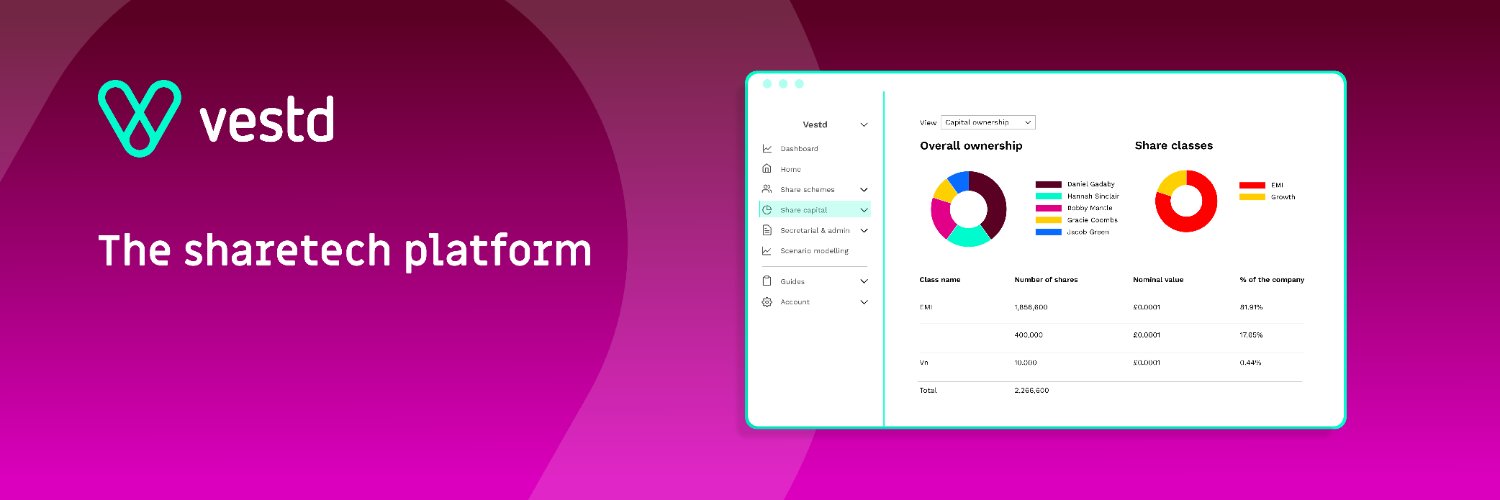

Vestd

City of London, United Kingdom
February 2025
Other professional, scientific & tech
Service with Minor Environmental Footprint
United Kingdom
Vestd is the leading sharetech platform for share schemes and business admin. The FCA-regulated platform makes light work of all of the most popular and tax-efficient share scheme types, empowering businesses to attract and retain their talent. Staff, advisors and consultants can log in to view their shares and model what their cut might look like if the company rises in value. An unrivalled motivator. Vestd makes share schemes a walk in the park. No wonder 95% say that Vestd has helped improve employee loyalty and 93% agree that it’s helped with employee attraction! And for investors, or those looking to secure investment… Vestd gets cap tables sparkling clean, makes cofounder prenups a walk in the park, makes shareholder comms and security as easy as pie and helps to make businesses irresistible to investors. Our mission Our big moonshot aim is to see one billion people worldwide invested in the companies that they work hard to grow. We are all about inclusion and fairness.
Overall B Impact Score
Governance 18.9
Governance evaluates a company's overall mission, engagement around its social/environmental impact, ethics, and transparency. This section also evaluates the ability of a company to protect their mission and formally consider stakeholders in decision making through their corporate structure (e.g. benefit corporation) or corporate governing documents.
What is this? A company with an Impact Business Model is intentionally designed to create a specific positive outcome for one of its stakeholders - such as workers, community, environment, or customers.
Workers 34.4
Workers evaluates a company’s contributions to its employees’ financial security, health & safety, wellness, career development, and engagement & satisfaction. In addition, this section recognizes business models designed to benefit workers, such as companies that are at least 40% owned by non-executive employees and those that have workforce development programs to support individuals with barriers to employment.
Community 14.7
Community evaluates a company’s engagement with and impact on the communities in which it operates, hires from, and sources from. Topics include diversity, equity & inclusion, economic impact, civic engagement, charitable giving, and supply chain management. In addition, this section recognizes business models that are designed to address specific community-oriented problems, such as poverty alleviation through fair trade sourcing or distribution via microenterprises, producer cooperative models, locally focused economic development, and formal charitable giving commitments.
Environment 8.1
Environment evaluates a company’s overall environmental management practices as well as its impact on the air, climate, water, land, and biodiversity. This includes the direct impact of a company’s operations and, when applicable its supply chain and distribution channels. This section also recognizes companies with environmentally innovative production processes and those that sell products or services that have a positive environmental impact. Some examples might include products and services that create renewable energy, reduce consumption or waste, conserve land or wildlife, provide less toxic alternatives to the market, or educate people about environmental problems.
Customers 3.8
Customers evaluates a company’s stewardship of its customers through the quality of its products and services, ethical marketing, data privacy and security, and feedback channels. In addition, this section recognizes products or services that are designed to address a particular social problem for or through its customers, such as health or educational products, arts & media products, serving underserved customers/clients, and services that improve the social impact of other businesses or organizations.